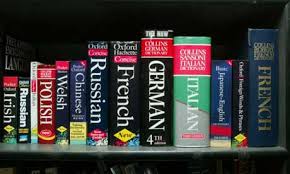I’m taking a class called the Art of Literary Translation this block. Basically what it entails is translating poetry and fiction from the language of my choice into English; so far I have been working from French, but I may do a poem from German later this block.
Anyway, since being in this class I have started to notice two important things. First of all, that translation is a much more creative pursuit than I thought it was going to be. Secondly, that the principals guiding a good translation are often applicable to all sorts of different topics, namely writing, reading, and performance.
When most people read a translated text, they probably don’t think about all the considerations the translator had to make–I certainly didn’t used to. There are so many different factors to take into account: cultural context, idioms, language markers, voice, figurative language, etc. How is all of that supposed to transfer intact from one language to another?
The simple answer: it’s not.
A good translation is never just a transcription of words into a different language. It’s about capturing the experience that a work gives those who read it in it’s original form. Sometimes that means a translator has to take liberties. They might change the words in a poem to maintain the essential rhyme scheme and meter, or they may replace a colloquial phrase from the original language with one that the target audience is more likely to recognize and connect with.
Creative writers working on an original piece often use the same principle. Perhaps they have an experience which affected them in a specific way, and they want to give that same sort of effect to their readers. Essentially what they have to do is translate their experience into a written form, that must then be adjusted from reality to make up for the lack of context the readers have concerning the original situation or series of events. The same can be said for adapting books to screen or stage. We’re always creating, even when it takes the form of translation.
As readers, I feel that we often neglect to notice how hard an author has worked on what we’re reading–how important every single word must have been, the hours and days and years it may have taken to put everything together. If that’s the case, it certainly must be doubly true for how we treat translators. Most of us probably don’t bother to remember the name of the person who translated our favorite foreign work. We forget too easily that they are artists, too.
Here’s to all the translators out there who are dedicated to increasing the amount of literary works the world has access to, and to trying to maintain the spirit and experiences bound up in an original piece of writing.